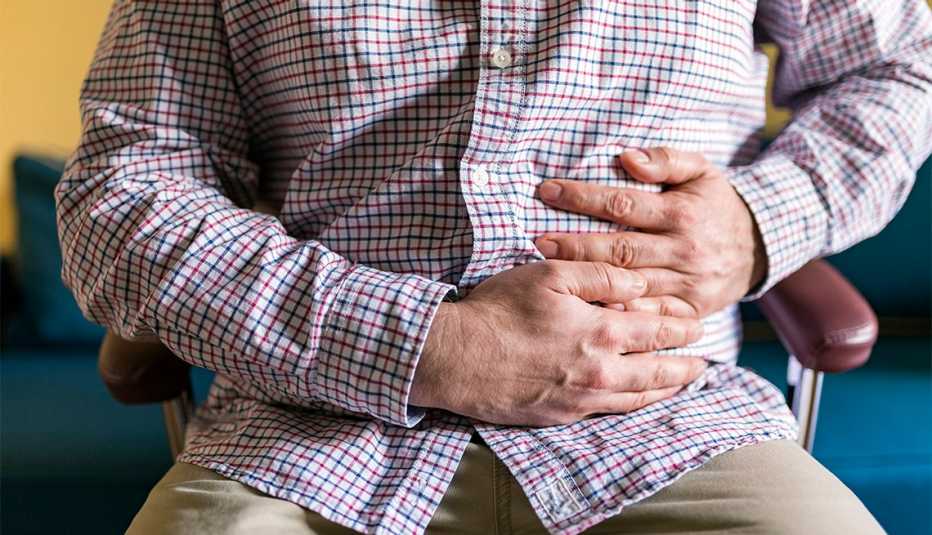6. Chronic or prolonged constipation (especially if you’re having pain)
Almost everyone experiences occasional bouts of constipation, and studies show that it’s especially prevalent among older adults. Constipation is typically defined as three or fewer bowel movements per week. It may not seem like a big deal, but if your constipation isn’t treated, over time the stools in your colon can become so large and solid that your body can’t remove them — and that can be painful or even deadly, Anthony warns. “If it goes longer than seven days, I want to see you,” he says. Constipation can be caused by a wide variety of issues, including certain medicines, a diet low in fiber, and medical conditions such as irritable bowel syndrome, thyroid issues, diabetes or, in rare cases, colorectal cancer.
7. Sudden, intense abdominal pain
A sharp pain that doesn’t let up can indicate acute appendicitis (if it’s on your lower right side), diverticulitis or a serious infection. The context is important, Lee says, because muscle cramps and other issues can also manifest as sharp pain. “If you’re an athlete rock climbing and you get a sharp pain in your abdomen that only lasts a second, you probably just pulled a muscle,” she says. If it’s something serious, she explains, usually the pain keeps escalating and doesn’t let up.
8. Frequent, severe or worsening heartburn
Occasional heartburn — a burning, uncomfortable sensation in your chest — is common among older adults and can usually be treated with over-the-counter medications. But if your heartburn is frequent and worsening, or if it’s not responding to medication, you may have gastroesophageal reflux disease (GERD), a disorder in which the valve between your stomach and esophagus doesn’t close properly. Left untreated, GERD can lead to complications including erosion or narrowing of the esophagus, or a precancerous condition called Barrett’s esophagus. In rare cases, severe heartburn can also indicate a more serious condition such as esophageal cancer or a hiatal hernia.
9. Swollen abdomen
It’s not unusual to feel bloated after you eat a big meal. But there’s a difference between bloating and distension, an actual increase in measured abdominal size. “Do you literally see your belly puffing out? Is it bigger in circumference?” Spiegel asks. If the answer is yes — and the symptom persists after you’ve had plenty of time to digest a meal — it can be a sign that excess fluid or gas is forming in your small intestine as the result of an obstruction, inflammation, bacterial overgrowth or a gastrointestinal disease.
10. Feeling full after eating very little
If you feel stuffed even though you didn’t eat much, the most common cause is gastroparesis, a condition in which food stays in the stomach longer than it should. It can happen when a severe illness “stunts the electrical system of the stomach,” Anthony says. Stomach surgery and diabetes can also trigger the condition, and it's been reported as a side effect of new weight loss medications. Although gastroparesis can resolve on its own, your doctor can prescribe medications that will stimulate your stomach to contract and help speed digestion. If it’s not gastroparesis, other more serious causes of early satiety include an ulcer, an obstruction or a tumor.
If you don’t have one of the above symptoms, don’t let that keep you from seeing a gastroenterologist if you suspect that something’s wrong, Lee says. The earlier you detect a problem, the more options you have and the better your chances of success at managing it.
“The longer I do this, the more I realize that it doesn’t matter what the textbook says — patients know their bodies,” Lee says. “If something is not normal for you, then it is a red flag, even if it’s not on the list of top five. If something bothers you, you should get it checked out.”
Editor’s note: This story, first published February 11, 2020, has been updated to include new information.





































































More From AARP
Diagnosed with Celiac Disease at 50-Plus?
Tips to help you transition to a gluten-free dietIs It Risky to Take Heartburn Medication?
Here's why you should talk to your doctor before starting, or stopping, treatment.
Is Your Stomach Bug Norovirus?
Know the symptoms — and how to avoid it in the first place